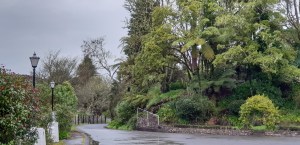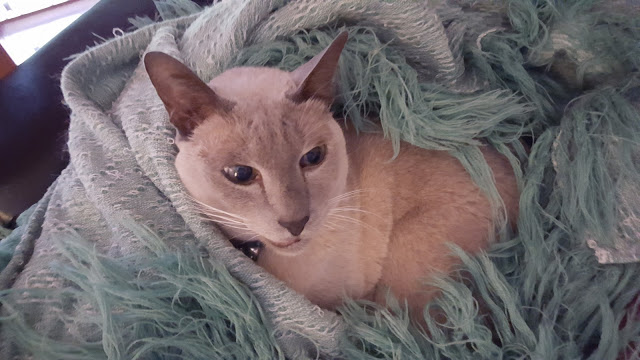Inside the old building, it was very quiet and almost cold.
Strange, perhaps, because outside the temperature was bordering on the record hottest day ever, nearly 45 degrees centigrade.
The people who’d built this building nearly a hundred years before must have known how to keep that heat at bay, using sandstone.
Back then, the sandstone would have looked very impressive, but now after many years of being closed off and left abandoned, the outside was stained by modern-day pollutants giving it a black streaky look, and inside layers of dust, easily stirred up as we walked slowly into the main foyer.
It was huge, the roof, ornate, with four huge chandelier lights hanging down, and wood paneling, giving way to a long counter with brass serving cages highlighting its former use; a bank.
In its day it would have conveyed the power and wealth so that its customers could trust the money to. Of course, that was before the global economy, online banking, and a raft of the new and different institutions all vying for that same money.
Then it was a simple choice of a few, now it was a few thousand.
“How many years had this been closed up?” I asked.
“Close to twenty, maybe twenty-five. It was supposed to be pulled down, but someone got it on the heritage list, and that put an end to it. “
Phil was the history nut. He’s spent a month looking into the building, finding construction plans, and correspondence dating back to before and during the construction.
Building methods, he said, that didn’t exist today and were far in advance of anything of its type for the period. It was the reason we were standing in the foyer now.
We were budding civil engineers, and the university had managed to organize a visit, at our own risk. The owner of the building had made sure we’d signed a health and safety waiver before granting access.
And the caretaker only took us as far as the front door. He gave us his cell number to call when we were finished. When we asked him why he didn’t want to come in with us, he didn’t say but it was clear to me he was afraid of something.
But neither of us believed in ghosts.
“You can see aspects of cathedrals in the design,” Phil said. ” You could quite easily turn this space into a church.”
“Or a very large wine cellar.” I brought a thermometer with me, and inside where we were standing it was the ideal temperature to store wine.
Behind the teller cages were four large iron doors to the vaults. They were huge, and once contained a large amount of cash, gold, and whatever else was deemed valuable.
They were all empty now, the shelves and floor had scattered pieces of bank stationery, and in a corner, several cardboard boxes, covered in even more dust.
Behind the vaults were offices, half-height with glass dividers, the desks and chairs still in place, and some with wooden filing cabinets drawers half-open.
Others had benches, and one, set in the corner, very large, and looked like the manager’s office. Unlike the other office which had linoleum tiles, this one had carpet. In a corner was a large mirror backed cabinet, with several half-empty bottles on it.
“Adds a whole new meaning to aged whiskey, don’t you think.” Phil looked at it but didn’t pick it up.
“I wonder why they left it,” I muttered. The place had the feel of having been left in a hurry, not taking everything with them.
I shivered, but it was not from the cold.
We went back to the foyer and the elevator lobby. They were fine examples of the sort of caged elevators that belonged in that time, and which there were very few working examples these days.
The elevators would have a driver, he would pull back an inner and outer door when the car arrived on a floor, and close both again when everyone was aboard.
Both cars were on the ground floor, with the shutter doors closed, and when I tried to open one, I found it had been welded shut. The other car was not sitting level with the floor and the reason for that, the cable that raised and lowered it was broken.
Restoring them would be a huge job and would not be in their original condition due to occupational health and safety issues.
The staircase wound around the elevator cage, going up to the mezzanine floor or down to the basement.
“Up or down?” He asked.
“Where do you want to go first?”
“Down. There’s supposed to be a large vault, probably where the safety deposit boxes are.”
And the restrooms I thought. Not that I was thinking of going.
As we descended the stairs it was like going down into a mine shaft, getting darker, and the rising odor of damp, and mustiness. I suspect it would have been the same back when it was first built being so close to the shoreline of the bay, not more than half a mile away.
The land this building and a number of others in a similar style, was built on was originally a swamp, and it was thought that the seawater still found its way this far inshore. But the foundations were incredibly strong and extensive which was why there’d been no shifting or cracking anywhere in the ten-story structure.
At the bottom, there was a huge arch, with built-in brass caging with two huge gates, both open. It was like the entrance to a mythical Aladdin’s cave.
There was also an indefinable aura coming from the depths of that room. That, and a movement of cold air. Curiously, the air down there was not musty but had a tinge of saltiness to it.
Was there a natural air freshener effect coming from somewhere within that vault.
“Are we going in?”
I checked my torch beam, still very bright. I pointed it into the blackness and after a minute checking, I said, “We’re here, so why not.”
We had to walk down a dozen steps then pass under through the open gates into the room. There was a second set of gates, the same as the first, about thirty feet from the first, and, in between, a number of cubicles where customers collected their boxes.
Beyond the second set of gates was a large circular reinforced safe door high enough for us to walk through.
This cavernous space stretched back quite a distance, and along the walls, rows, and rows of safety deposit boxes, some half hanging out of their housing, and a lot more stacked haphazardly on the floor.
I checked a few but they were all empty.
I shivered again. It felt like there was a presence in the room. I turned to ask Phil, but he wasn’t there. I hadn’t heard him walk away, and there were only two sets of footprints on the floor, his and mine, and both ended where I was standing.
It was as if he had disappeared into thin air.
I called out his name, and it echoed off the walls in the confined space. No answer from him.
I went further into the room, thinking he might have ventured towards the end while my back was turned, but he hadn’t. Nor had he left because there were only footprints coming in, not going out.
I turned to retrace my steps and stopped suddenly. An old man, in clothes that didn’t belong to this era, was standing where Phil had last been.
He was looking at me, but not inclined to talk.
“Hello. I didn’t see you come down.”
Seconds later the figure dissolved in front of me and there was no one but me standing in the room.
“Joe.”
Phil, from behind me. I turned and there he was large as life.
“Where were you?”
“I’ve been here all the time. Who were you just talking to?”
“There was an old man, standing just over there,” I said pointing to somewhere between Phil and the entrance.
“I didn’t see anyone. Are you sure you’re not having me on?”
“No. He’s right behind you.” The old man had reappeared.
Phil shook his head, believing I was trying to fool him.
That changed when the man touched his shoulder, and Phil shrieked.
And almost ran out of the room. It took a few minutes for him to catch his breath and steady the palpitating heart.
“Are you real?” I asked, not quite sure what to say.
“To me, I am. To anyone else, let’s just say you are the first not got faint, or run away.”
“Are you a ghost?” Phil wasn’t exactly sure what he was saying.
“Apparently I am and will be until you find out who killed me “
Ok, so what was it called, stuck in the afterlife or limbo until closure?
“When?”
“25 years ago, just before the bank closed. It’s the reason why it’s empty now.”
“And you’re saying we find the killer and you get to leave?”
“Exactly. Now shoo. Go and find him.”
We looked at each other in surprise, or more like shock, then back to the man. Only he was no longer there.
“What the…” Phil sail. “It’s time to go.”
“What about the man and finding his killer?”
“What man? We saw nothing. We’re done here.”
I shrugged. Phil turned to leave, but only managed to take three steps before the gates at the entrance closed with a loud clang.
When he crossed the room to stand in front, he tried pulling them open.
“Locked,” he said. Flat, and without panic, he added, “I guess it looks like we have a murder to solve.”
© Charles Heath 2019-2020









